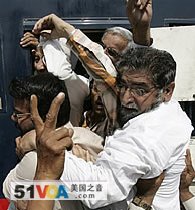Islamabad
12 March 2009
Demonstrators in Pakistan have defied a government ban on rallies to embark on a protest convoy to the capital. Hundreds of protesters set out from two southern cities, but police arrested dozens of people throughout the day, including some organizers.
 |
| Police arrest protesters for participating in anti-government march in Karachi, Pakistan, 12 Mar 2009 |
The arrest of hundreds of demonstrators continued Thursday, with more detentions reported in Karachi. After police allowed a convoy of vehicles to leave the downtown area, officers rounded up scores of lawyers at a toll booth outside of the city, stuffing them into waiting buses. Some organizers were among those detained.
Demonstrators in Quetta were not subject to the new ban on political rallies and few clashes with police were reported.
In Quetta, Supreme Court Bar Association President Ali Ahmad Kurd said he felt confident about the chances of reinstating the deposed chief justice of the supreme court, who has become a unifying symbol for opponents of the ruling Pakistan People's Party and President Asif Zardari.
"The government does not have the power to sabotage this movement," Kurd said. "And Inshallah you will see the long march where hundreds of thousands people will join us and when we reach Constitution Avenue in Islamabad it will be the climax of the lawyer's movement."
The protesters plan to work their way north in vehicle convoys, gradually adding to their numbers as they move through cities and towns in the coming days. The convoys are easily tracked by police, who set up blockades to intercept convoys on major roads.
Lawyers have questioned the legality of the ban on political rallies, but officials continue to insist they are more interested in ensuring public safety than stifling political dissent. The head of the interior ministry, Rehman Malik, told members of parliament that there have been too many suicide bombings and terrorist attacks against processions on Pakistan's roads.
"Processions, demonstrations, this is part of democracy and that should not be denied," Malik said. "Let there be a long march, but let it not be in the streets."
Demonstrators plan to converge on the capital city Monday, when convoys from the south will meet up with lawyers and activists from Peshawar.
Authorities have boosted security in Islamabad and are believed to be staging large container trucks to block major roads into the city. Officials say protesters will not be allowed to rally outside parliament, and should instead gather at a field on the outskirts of the city.